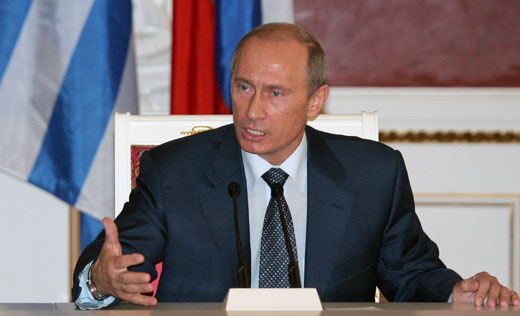
Russia Takes Aim at Missile Shield
Russia’s president has promised retaliatory action against plans for installing part of the U.S. missile shield on his nation’s doorstep.
The United States is negotiating with the Czech Republic and Poland to install a radar system and interceptor missiles for the European arm of nato’s missile defense system.
Speaking to journalists from the G8 countries before the opening of this week’s summit in Heiligendamm, Germany, Russian President VladimirPutin said, “What kind of steps are we going to take in response? Of course, we are going to get new targets in Europe.” Putin then suggested that Russia could include using nuclear weapons in the response.
The U.S. says the missile defense system, which would not hold nuclear warheads, is intended to protect the U.S. and Europe from rogue nations with nuclear know-how such as Iran. It says the shield does not pose a threat to Russia, which could easily overwhelm the 10 missile interceptors the U.S. wants to install in Poland.
Why, then, the strong response from Putin?
Russia’s fiery rhetoric demonstrates its frustration at the steady eastward expansion of the European Union and nato. Nations once under Russia’s iron grip such as Ukraine, Moldova and Georgia are now heavily involved with these Western institutions. Putin is clearly trying to reclaim his nation’s world power status.
Despite the Cold War rhetoric, Putin’s Russia is far less powerful than the Soviet Empire. Although it holds influence in Europe because of its natural gas and oil, Russia still needs Western investment to update its infrastructure to continue mining its raw resources. Its military is largely outdated and staffed by poorly paid conscripts.
Still, the nuclear threat is one Europe takes seriously. In fact, it was this threat that initially helped unify Western Europe and produced the nato alliance.
If Russia were indeed to turn its words into action, the results would be much the same as before. Only this time, with the Soviet Union long gone, any heightened threat from Russia will motivate the unification of all of Europe, west and east. French President Nicolas Sarkozy and Estonian President Toomas Hendrik Ilves have already voiced their support for defending Europe.
Putin’s rhetoric and Russia’s recent missile tests already give those in Europe who wish for a more federated EU all the ammunition they need in order to argue for a stronger, more centralized EU superstate.
To learn more about the EU’s direction, read “Russia Frightens Europe—and Fulfills Bible Prophecy.”
